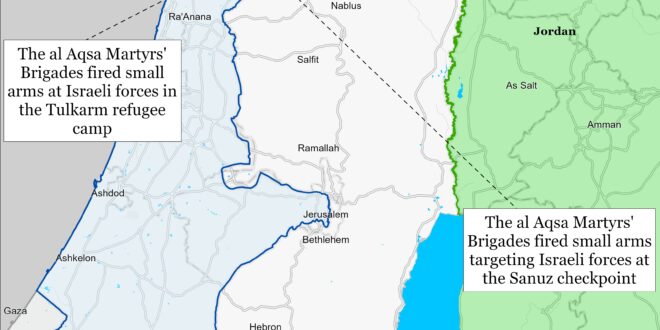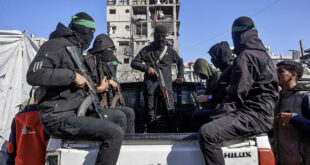CORRECTION: The March 14, 2024, edition of the Gaza Strip maps described the jetty that is under construction along the Gazan coast to facilitate the delivery of aid as “Israeli-built.” NGO World Central Kitchen is building this jetty, not Israel.[i] We apologize for the error.
Unspecified Iranian officials said that Iran could “intensify its proxy war” against Israel if Israel attacks Lebanese Hezbollah, which is consistent with Iran’s decades-old use of its proxies.[ii] Seven Iranian, Lebanese, and regional sources told Reuters on March 14 that IRGC Quds Force Commander Brig. Gen. Esmail Ghaani met with Hezbollah Secretary General Hassan Nasrallah in Beirut in February 2024 to discuss the possibility of an Israeli offensive against Hezbollah.[iii] Three of the sources told Reuters that an Israeli offensive against Hezbollah “could pressure Iran to react more forcefully” by intensifying “its proxy war” against Israel.[iv] Iran has avoided directly fighting Israel and the United States in the current war, instead using its proxies across the region to fight on Iran’s behalf. Iran has long used its regional proxies to pursue Iranian strategic objectives throughout the region. This strategy decreases the risk that Iran will face direct retaliation from its adversaries by obfuscating Iran’s role in escalation. Iranian media reported in October 2023 that Iran formed a “joint operations room” to coordinate operations and attacks against Israel and the United States with its proxies in Palestine, Lebanon, Syria, Iraq, and Yemen.[v] Iranian media claimed that Hezbollah would use Syrian ground forces–as part of the joint operations room–to invade Israel in the event of an Israeli attack on Hezbollah. Hezbollah is closely affiliated with the Syrian Arab Army’s 1st Corps.[vi]
The Iranian officials may also have been messaging Iran’s opposition to a direct confrontation with Israel to try to appease the Iranian public. An Iranian source told Reuters that Supreme Leader Ali Khamenei seeks to avoid a direct war with Israel.[vii] Some Iranians criticize the regime for funding Iran’s proxies and focusing on external affairs while failing to improve citizens’ lives and the economy.[viii] Many of the sociocultural, economic, and political frustrations that ignited the Mahsa Amini movement that began in September 2022 remain prevalent among the Iranian population, moreover.[ix]
Key Takeaways:
- Lebanon: Unspecified Iranian officials said that Iran could “intensify its proxy war” against Israel if Israel attacks Lebanese Hezbollah, which is consistent with Iran’s decades-old use of its proxies.
- Iran has long used its regional proxies to pursue Iranian strategic objectives throughout the region. This strategy decreases the risk that Iran will face direct retaliation from its adversaries by obfuscating Iran’s role in escalation.
- Iranian media reported in October 2023 that Iran formed a “joint operations room” to coordinate operations and attacks against Israel and the United States with its proxies in Palestine, Lebanon, Syria, Iraq, and Yemen.
- Iranian media claimed that Hezbollah would use Syrian ground forces—as part of the joint operations room—to invade Israel in the event of an Israeli attack on Hezbollah. Hezbollah is closely affiliated with the Syrian Arab Army’s 1st Corps.
- The Telegraph reported that five Iranian-controlled, US-sanctioned container ships are using European ports to disguise weapons shipments to Lebanese Hezbollah.
- Northern Gaza Strip: Palestinian fighters clashed with Israeli forces in Zahra, south of Gaza City.
- Negotiations: Hamas submitted a ceasefire proposal and a hostage-for-prisoner exchange to international mediators.
- Yemen: Houthi fighters conducted at least three attacks targeting civilian and military vessels in the Red Sea and the Gulf of Aden.
- Syria: Israel likely conducted a drone strike targeting a truck transporting weapons for Iranian-backed militias near Albu Kamal, Syria.
- Iran: The G7 countries warned Iran that it should not transfer missiles to Russia.
- West Bank: Tens of thousands of Palestinian worshippers gathered peacefully at the al Aqsa Mosque in Jerusalem for Ramadan prayers, despite repeated Hamas calls to “defend” the mosque.
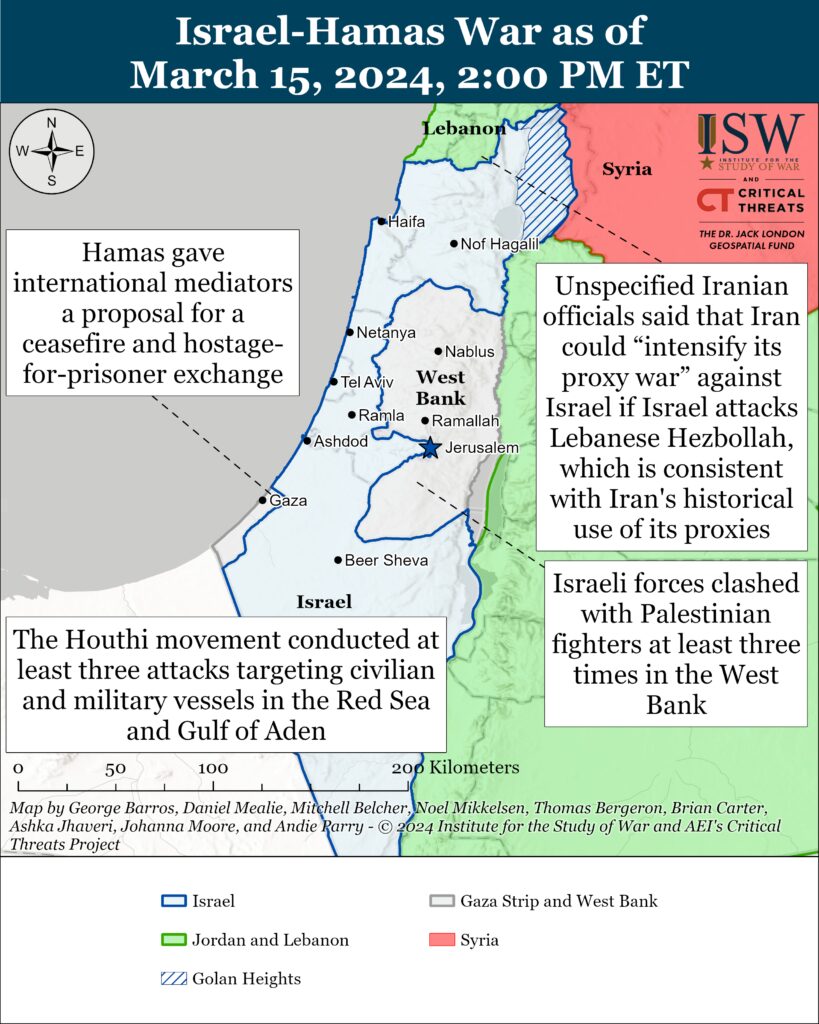
Gaza Strip
Axis of Resistance campaign objectives:
Erode the will of the Israeli political establishment and public to launch and sustain a major ground operation into the Gaza Strip
Degrade IDF material and morale around the Gaza Strip.Palestinian fighters clashed with Israeli forces in Zahra, south of Gaza City, on March 15. Three Palestinian militias, including Hamas, targeted Israeli forces in Zahra using rocket-propelled grenades (RPG), thermobaric rockets, and indirect rocket fire.[x] The militias may have infiltrated into Zahra and other areas of southern Gaza City from areas of the central Gaza Strip that the Israel Defense Force (IDF) has not yet cleared. The militias also likely reactivated dormant cells after the Israelis decreased the number of IDF troops in the northern Strip.
The IDF Nahal Brigade (162 Division) killed ten Palestinian fighters in an unspecified area in the central Gaza Strip on March 15.[xi] Israeli forces are currently operating at the intersection of the northern and central Strip near Wadi Gaza.[xii]
Israeli forces continued to conduct clearing operations in Khan Younis on March 15. Israeli forces directed an airstrike targeting a Palestinian militia squad that was loading explosives into a vehicle in Khan Younis.[xiii] Hamas fighters fired RPGs targeting Israeli forces in Hamad neighborhood.[xiv] Hamas fighters returned from the frontlines in Hamad and said that they had conducted a complex attack by detonating an explosively-formed penetrator (EFP) and firing a thermobaric rocket targeting an Israeli armored vehicle.[xv]
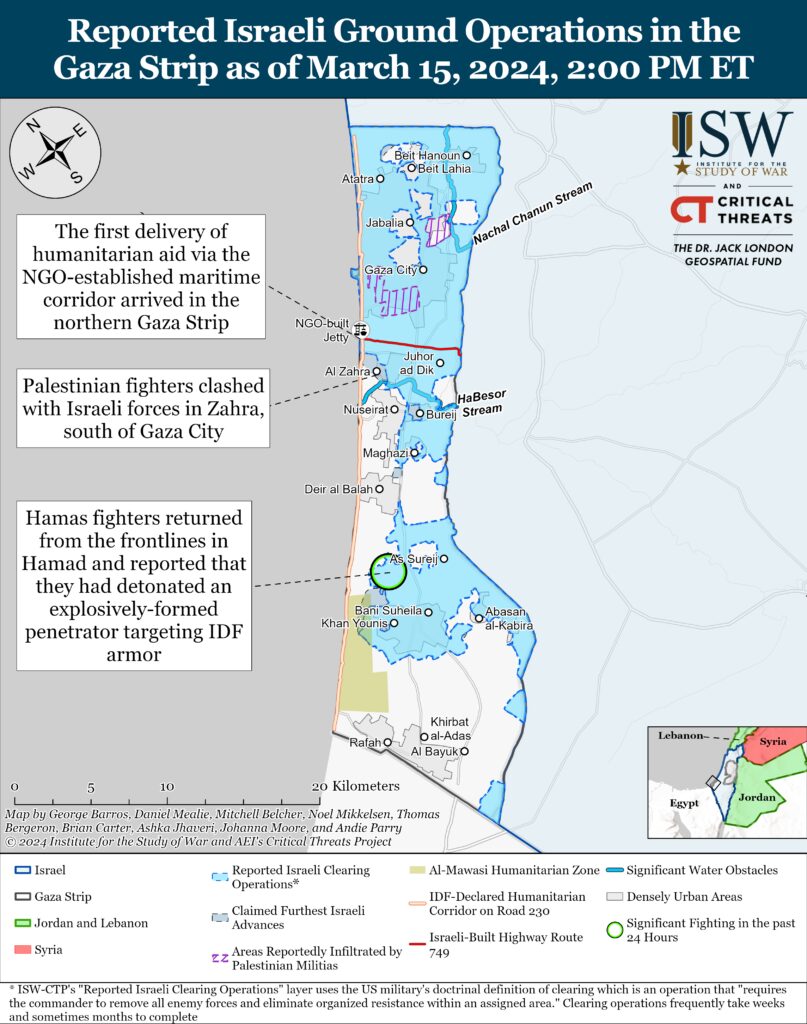
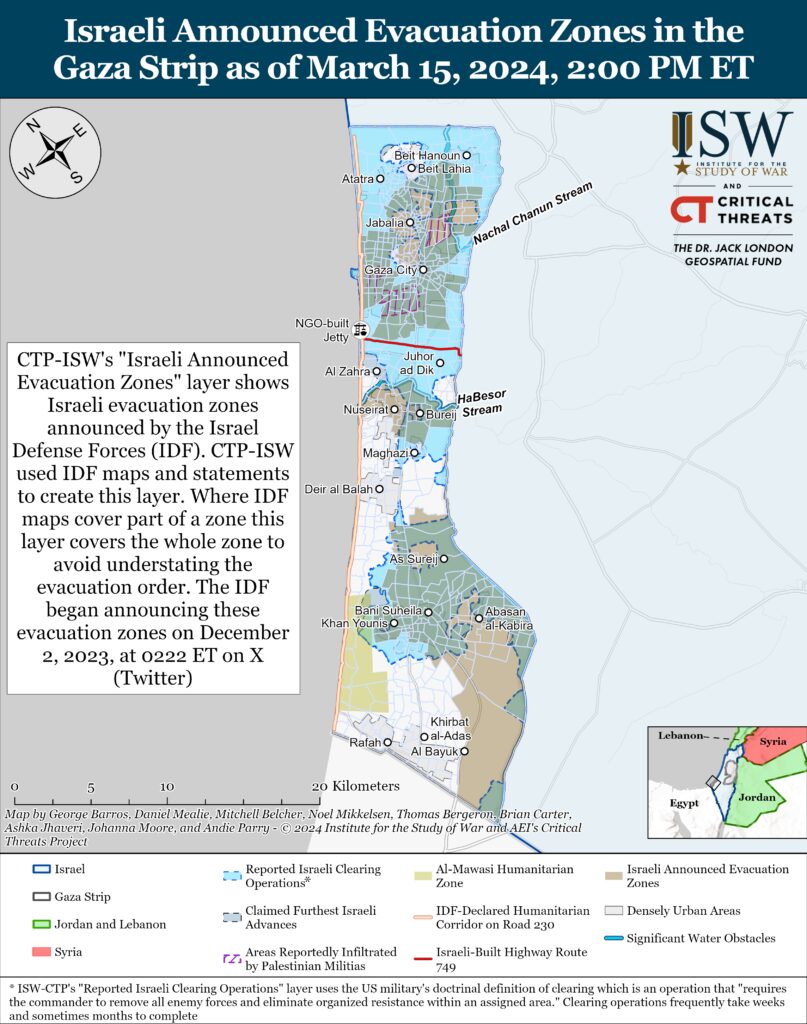
CORRECTION: The March 14, 2024, edition of the Gaza Strip maps described the jetty that is under construction along the Gazan coast to facilitate the delivery of aid as “Israeli-built.” NGO World Central Kitchen is building this jetty, not Israel.[xvi] We apologize for the error.
Hamas submitted a ceasefire proposal and a hostage-for-prisoner exchange to international mediators on March 14.[xvii] The proposal is Hamas’ response to the US, Qatari, and Egyptian proposal that Hamas has been deliberating over for weeks.[xviii] Hamas’ statement said that the proposal includes a ceasefire, calls for Israel to release Palestinian prisoners, an increase in the delivery of humanitarian aid to the Gaza Strip, return of displaced Palestinians, and a withdrawal of Israeli forces from the Strip.[xix] The Israeli Prime Minister’s Office said that Hamas continues to make “unrealistic demands.”[xx] A senior Israeli official noted that Hamas’ proposal included the number of Palestinian prisoners that Hamas demands Israel release as part of the deal.[xxi] The number of Palestinian prisoners Hamas is demanding has been a point of contention during ceasefire negotiations. Hamas reportedly expressed readiness to reduce the number of Palestinian prisoners whom Israel would release.[xxii] CNN reported that Israel is sending a delegation to Doha for further talks.[xxiii]
The first delivery of humanitarian aid via the maritime corridor arrived in the northern Gaza Strip on March 15.[xxiv] The first humanitarian aid ship left Cyprus on March 12. The UAE and Cyprus funded the project, and World Central Kitchen (WCK) organized the delivery.[xxv] The IDF confirmed on March 15 that its forces are on land and at sea to secure the delivery area.[xxvi] The ship contained 115 tons of food and water. WCK transferred the food and water into 12 trucks that then distributed the aid in the northern Gaza Strip.
Israeli Defense Minister Yoav Gallant said the best option Israel has for the future leader in the Gaza Strip will be local Palestinians who are affiliated with the Palestinian Authority (PA).[xxvii] Israeli media reported that Israeli Prime Minister Benjamin Netanyahu hopes to allow local clans unaffiliated with Hamas or the PA to rule the Gaza Strip after the war ends.[xxviii] Hamas reportedly killed the head of a local clan in Gaza City on March 13. Palestinian civilians accused the clan of cooperation with Israel.[xxix] The attack demonstrates that Hamas intends to reassert its authority in the Gaza Strip and suppress political opposition.
Hamas criticized PA President Mahmoud Abbas’ appointment of a new prime minister.[xxx] Abbas appointed current Palestinian Investment Fund Chairman Mohammad Mustafa as the new PA prime minister on March 14.[xxxi] Abbas tasked him with forming a new government that will seek to rebuild the Gaza Strip after the war. Hamas stated on March 15 that Abbas’ decision is an “individual decision” that is “devoid of substance,” noting that Palestinians have lost confidence in the PA’s policies.[xxxii]
Hamas announced on March 15 that it established a “government” with Palestinian armed groups, including the Palestinian Islamic Jihad (PIJ), in response to Mustafa’s appointment.[xxxiii] Hamas warned that ”political exclusivity will grow,” and that ”division will deepen” without a national consensus on a government.
PIJ fighters fired rockets targeting unspecified Israeli towns surrounding the Gaza Strip on March 14.[xxxiv] The IDF Air Force and artillery forces targeted Palestinian military infrastructure in the northern Gaza Strip on March 15 in response to rocket launches into southern Israel on March 14.[xxxv]
West Bank
Axis of Resistance campaign objectives:
Draw IDF assets and resources toward the West Bank and fix them thereIsraeli forces have clashed with Palestinian fighters at least three times in the West Bank since CTP-ISW’s last data cutoff on March 14.[xxxvi] The IDF said on March 15 that it has conducted over 60 ”brigade operations” in the West Bank since the Israel-Hamas war began.[xxxvii] The IDF also said that more than half of Palestinians that Israel has detained in the West Bank are associated with Hamas.[xxxviii]
Tens of thousands of Palestinian worshippers gathered peacefully at the al Aqsa Mosque in Jerusalem for Ramadan prayers on March 15, despite repeated Hamas calls to “defend” the mosque.[xxxix] Israeli police reported that there were no confrontations during the prayers.[xl] Hamas Political Bureau Chairman Ismail Haniyeh called in February for marches on al Aqsa Mosque during Ramadan.[xli] Ramadan began on March 10. Hamas released several statements in March the called for Palestinians to escalate attacks against Israeli forces in the West Bank.[xlii]
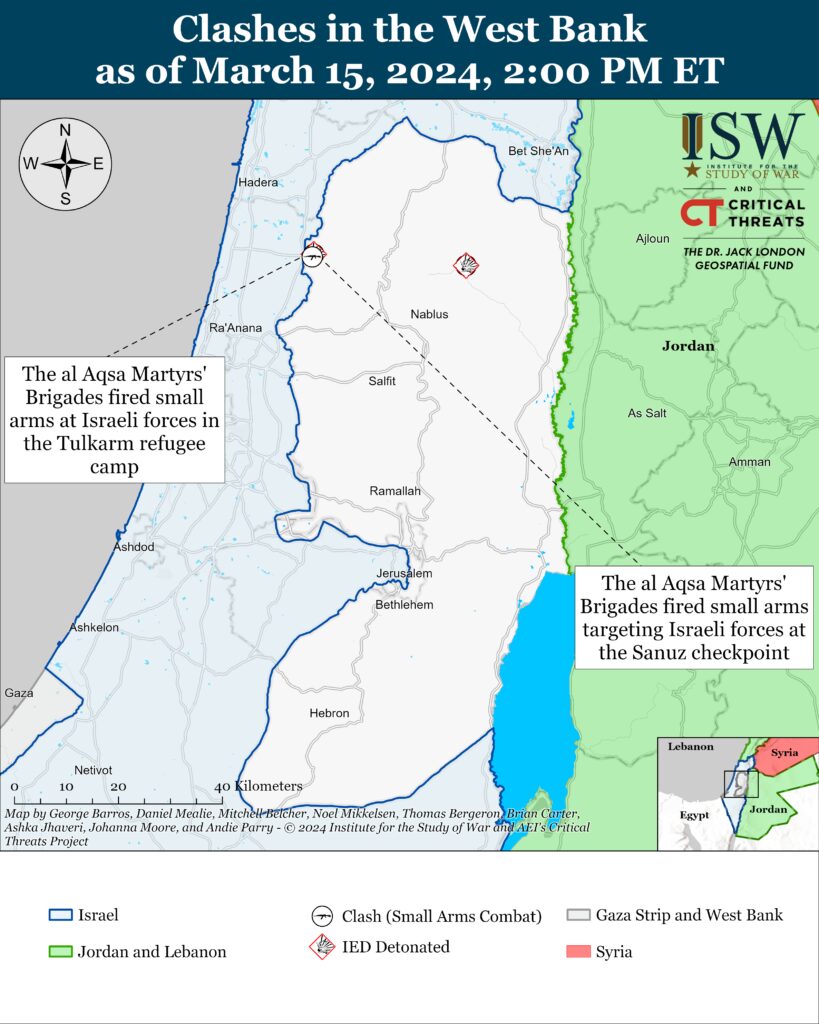
This map is not an exhaustive depiction of clashes and demonstrations in the West Bank.
Southern Lebanon and Golan Heights
Axis of Resistance campaign objectives:
Draw IDF assets and resources toward northern Israel and fix them there
Set conditions for successive campaigns into northern IsraelIranian-backed militias, including Lebanese Hezbollah, have conducted at least 13 attacks from southern Lebanon into northern Israel since CTP-ISW’s last data cutoff on March 14.[xliii]
The Telegraph reported on March 14 that five Iranian-controlled, US-sanctioned container ships are using European ports to disguise weapons shipments to Lebanese Hezbollah.[xliv] The Telegraph reported that the Iranian ships transport weapons from Bandar Abbas, Iran, to Latakia, Syria. Unspecified sources told the Telegraph that some of these ships continue to Belgium, Italy, and Spain to obfuscate the nature of the shipments. One of the sources said that Iran has relied on shipping weapons to Hezbollah by sea following Israeli attacks on Iranian land shipments from Iraq to Syria.[xlv] Israel has conducted an air campaign in Syria in recent months meant to disrupt Iran’s efforts to transfer weapons and military systems to Hezbollah and other Iranian partners in the Levant.[xlvi] Hezbollah members have claimed previously that the group controls surveillance at the port and that the port is ”ours, [Hezbollah’s].”[xlvii]
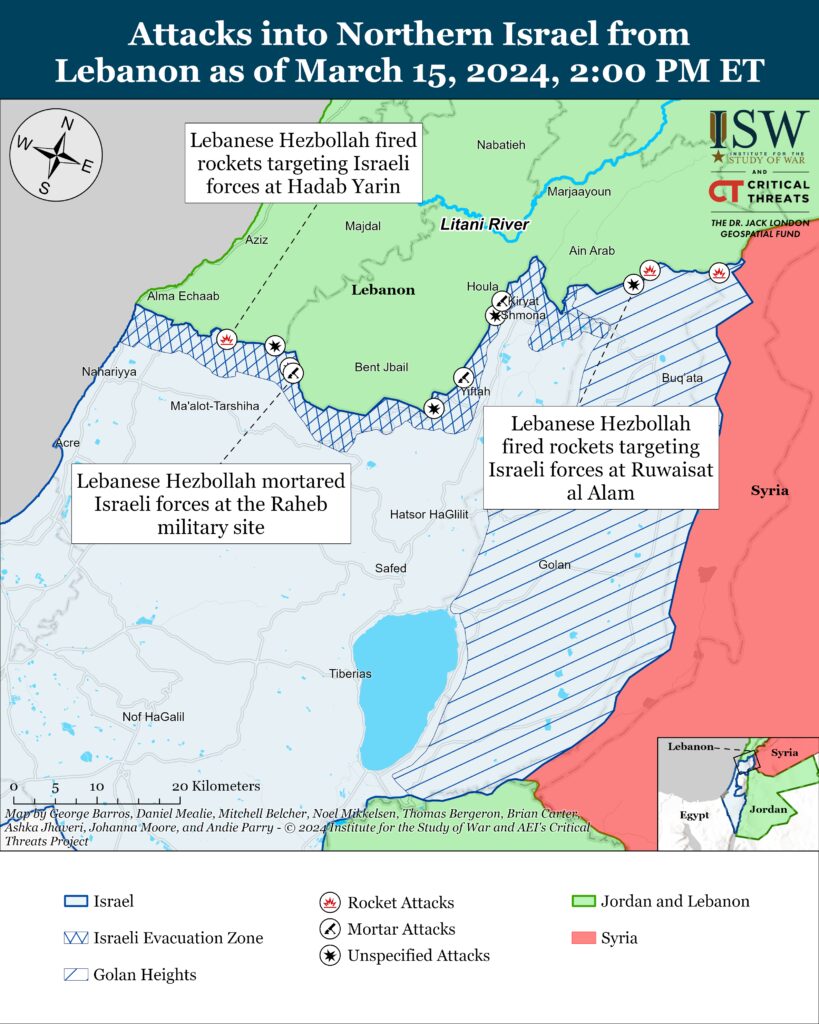
Recorded reports of attacks; CTP-ISW cannot independently verify impact.
Iran and Axis of Resistance
Axis of Resistance campaign objectives:
Demonstrate the capability and willingness of Iran and the Axis of Resistance to escalate against the United States and Israel on multiple fronts
Set conditions to fight a regional war on multiple frontsIsrael likely conducted a drone strike on March 15 targeting a truck transporting weapons for Iranian-backed militias near Albu Kamal, Syria.[xlviii] A local Syrian outlet reported that the militia fighters were transporting Iranian missile parts to Lebanese Hezbollah.[xlix] The IDF previously said in February 2024 that it had conducted a series of airstrikes targeting more than 50 Hezbollah and Hezbollah-affiliated targets in Syria since the start of the Israel-Hamas war to interdict Iranian weapons shipments to Hezbollah through Syria.[l]
Iranian state media said on March 14 that Iran and the United States conducted secret indirect nuclear negotiations in Oman in January 2024, thus confirming earlier Western reports.[li] The Financial Times reported that the talks were primarily focused on convincing Tehran to pressure the Houthis to halt attacks on maritime traffic in the Red Sea but included discussions over Iran’s nuclear program.[lii] Iranian state media denied that the negotiations addressed the Houthi attacks but confirmed that the two sides held nuclear negotiations, citing an unspecified “informed” Iranian source.[liii]
The G7 countries warned Iran on March 15 that it should not transfer missiles to Russia .[liv] The G7 countries threatened “new and significant measures against Iran,” including new sanctions, if Iran transfers missiles to Russia. Western media reported that the G7 is considering is banning Iran’s national air carrier, Iran Air, from conducting flights to Europe.[lv] American and European officials told Western media on March 15 that they have no evidence confirming that Iran has supplied missiles to Russia..[lvi] Iranian sources told Reuters on February 21 that Iran provided hundreds of short-range ballistic missiles to Russia in early January.[lvii]
Iranian Ambassador to Qatar Ali Saleh Abadi discussed security cooperation with Qatari Interior Minister and Internal Security Force (Lekhwiya) Commander Sheikh Khalifa bin Hamad al Thani in Doha on March 14.[lviii] Abadi previously served as the governor of Iran’s Central Bank between October 2021 and December 2022 and has served as Iran’s ambassador to Qatar since August 2023.[lix] Abadi’s appointment coincided with the transfer of $6 billion worth of frozen Iranian assets to Qatari banks as part of a prisoner swap agreement with the United States.[lx] The Lekhwiya is a Qatari security service responsible for counterterrorism, riot control, the maintenance of security and public order, and the protection of Qatar’s borders and coasts.[lxi] Thani previously took military training courses on combating terrorism and riot control between 2015 and 2018.[lxii]
Houthi fighters have conducted at least three attacks targeting civilian and military vessels in the Red Sea and the Gulf of Aden since CTP-ISW’s last data cut off on March 14.[lxiii] US CENTCOM reported that the Houthis conducted two anti-ship ballistic missile attacks from Houthi-controlled Yemen, targeting unspecified targets in the Red Sea and the Gulf of Aden.[lxiv] Houthi military spokesperson Yahya Saree claimed on March 15 that Houthi fighters had targeted the Panama-flagged, Vietnamese-owned Pacific 01 merchant vessel in the Red Sea.[lxv] The United Kingdom Maritime Trade Operations separately reported an explosion occurred alongside a vessel on March 15 approximately 65 nautical miles west of Hudaydah in the Red Sea.[lxvi] The vessel did not suffer any damage.[lxvii] Saree also claimed that the Houthis launched one-way attack drones targeting a US warship in the Red Sea.[lxviii]
US CENTCOM reported on March 14 that it conducted preemptive strikes targeting nine anti-ship missiles and two drones in Houthi-controlled Yemen.[lxix] CENTCOM determined that the munitions presented an “imminent threat to merchant vessels and US Navy ships in the region.”
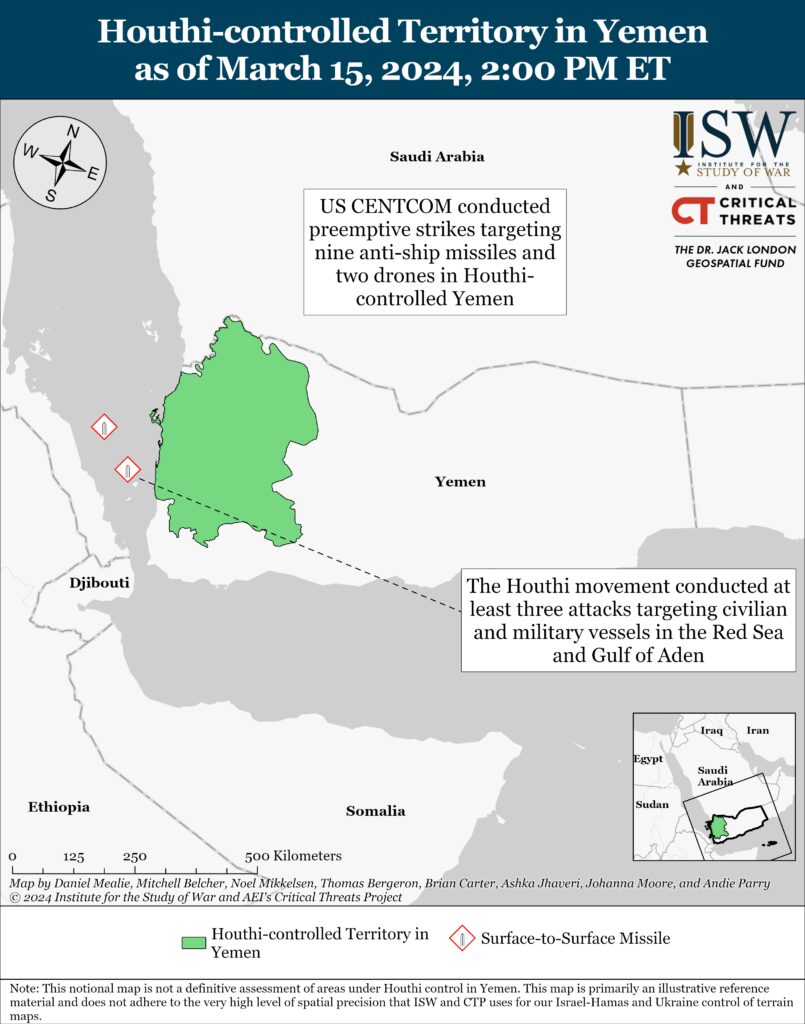
The United States and the United Kingdom expressed their support to boost the UN Verification and Inspection Mechanism’s (UNVIM) capacity to inspect shipments to Houthi-controlled ports during a UNSC meeting on March 14.[lxx] US Alternative Representative for Special Political Affairs, Ambassador Robert Wood, stated that UNVIM is critical to identifying violations of the Houthi arms embargo and preventing weapon shipments to the Houthis.[lxxi] UNVIM operates under the auspices of UN Security Council Resolution 2216 to monitor commercial and bilateral aid shipments bound for Yemeni ports in the Red Sea and inspect the cargo for banned items, including weapons.[lxxii] UNSC Resolution 2216 demanded an immediate ceasefire in Yemen in 2015 and imposed sanctions, a travel ban, and an arms embargo on Houthi supreme leader Abdulmalik al Houthi.[lxxiii] Iran continues to supply advanced conventional weapons and ”other lethal aid” to the Houthis in support of the group’s attack campaign in the Red Sea and the Gulf of Aden, according to US officials.[lxxiv]
 Eurasia Press & News
Eurasia Press & News
